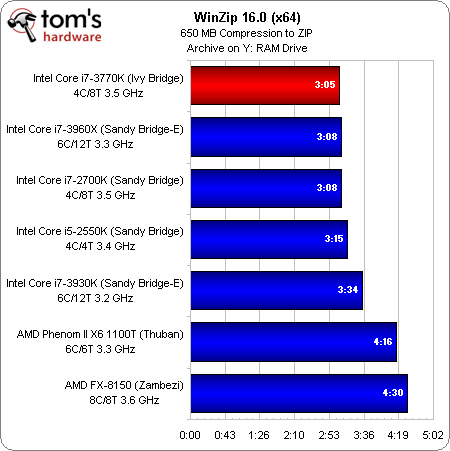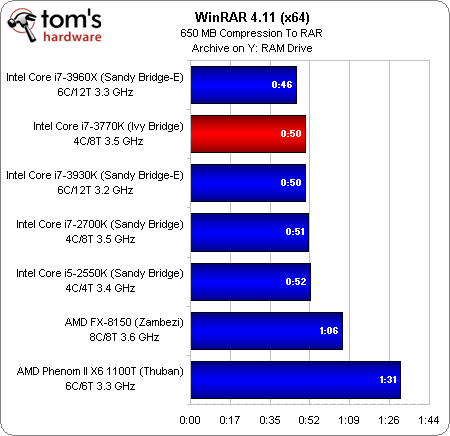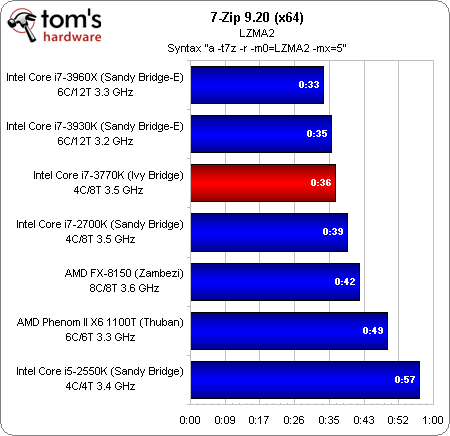Intel Core i7-3770K Review: A Small Step Up For Ivy Bridge
Benchmark Results: File Compression
Recently adopting WinZip 16 doesn’t seem to have helped with the software’s inability to utilize multi-core processors effectively. As such, Ivy Bridge’s slight IPC advantage garners it another top finish, just ahead of the Core i7-3960X and -2700K. Fortunately, we have inside information that indicates WinZip’s next incarnation will be more competitive.
More aggressive optimizations for parallelism give Intel’s Core i7-3960X an edge in WinRAR, allowing it to reclaim the top spot, though the quad-core Ivy Bridge chip does manage to tie the $600 Core i7-3930K.
Let’s not mince words, though. Core i7-2700K is just one second behind the new chip, and the $220 Core i5-2550K is just two seconds back. You certainly won’t have much to complain about if saving some money is more important than waiting a couple of extra seconds for a folder full of files to compress.
Long known as the file compression/decompression utility in our suite best optimized for multi-core processors, 7-Zip puts both Sandy Bridge-E based CPUs in the lead, followed closely by Core i7-3770K.
The real loser here is Core i5, which sports four cores, but lacks Hyper-Threading, landing it in last place. AMD’s Bulldozer-based FX-8150 fares better in the face of more aggressive threading, though it can’t quite catch the Core i7-2700K.
Get Tom's Hardware's best news and in-depth reviews, straight to your inbox.
Current page: Benchmark Results: File Compression
Prev Page Benchmark Results: Productivity Next Page Benchmark Results: Media Encoding-
tecmo34 Nice Review Chris...Reply
Looking forward to the further information coming out this week on Ivy Bridge, as I was initially planning on buying Ivy Bridge, but now I might turn to Sandy Bridge-E -
jaquith Great and long waited review - Thanks Chris!Reply
Temps as expected are high on the IB, but better than early ES which is very good.
Those with their SB or SB-E (K/X) should be feeling good about now ;) -
xtremexx saw this just pop up on google, posted 1 min ago, anyway im probably going to update i have a core i3 2100 so this is pretty good.Reply -
ojas it's heeearrree!!!!! lol i though intel wan't launching it, been scouring the web for an hour for some mention.Reply
Now, time to read the review. :D -
zanny It gets higher temps at lower frequencies? What the hell did Intel break?Reply
I really wish they would introduce a gaming platform between their stupidly overpriced x79esque server platform and the integrated graphics chips they are pushing mainstream. 50% more transistors should be 30% or so more performance or a much smaller chip, but gamers get nothing out of Ivy Bridge. -
JAYDEEJOHN It makes sense Intel is making this its quickest ramp ever, as they see ARM on the horizon in today's changing market.Reply
They're using their process to get to places they'll need to get to in the future -
verbalizer OK after reading most of the review and definitely studying the charts;Reply
I have a few things on my mind.
1.) AMD - C'mon and get it together, you need to do better...2.) imagine if Intel made an i7-2660K or something like the i5-2550K they have now.
3.) SB-E is not for gaming (too highly priced...) compared to i7 or i5 Sandy Bridge
4.) Ivy Bridge runs hot.......
5.) IB average 3.7% faster than i7 SB and only 16% over i5 SB = not worth it
6.) AMD - C'mon and get it together, you need to do better...
(moderator edit..) -
Pezcore27 Good review.Reply
To me it shows 2 main things. 1) that Ivy didn't improve on Sandy Bridge as much as Intel was hoping it would, and 2) just how far behind AMD actually is... -
tmk221 It's a shame that this chip is marginally faster than 2700k. I guess it's all AMD fault. there is simply no pressure on Intel. Otherwise they would already moved to 8, 6, and 4 cores processors. Especially now when they have 4 cores under 77W.Reply
Yea yea I know most apps won't use 8 cores, but that's only because there was no 8 cores processors in past, not the other way around



